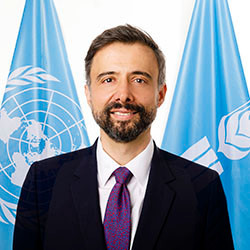World Farmers Markets Coalition General Assembly
IFAD Asset Request Portlet
Agrégateur de contenus
World Farmers Markets Coalition - General Assembly
Remarks by Alvaro Lario, President of IFAD
Par Alvaro Lario
Où: Rome, Italy
22 mai 2023Check against delivery
Farmers Markets: a tool for growing local food systems to achieve food security
Dear Friends,
Buongiorno a tutti! È un onore per me partecipare alla prima Assemblea Generale della World Farmers Markets Coalition.
Sono grato a tutti coloro che ogni giorno lavorano per garantire sistemi agro-alimentari inclusivi e sostenibili.
Un pensiero speciale oggi va agli agricoltori e al popolo dell’Emilia Romagna.
(English)
We are here today because we know that food matters; what we eat; how it is grown; the people who produce it. That is why IFAD invests in small-scale farmers, fishers, pastoralists and forest dwellers. We invest in rural women and men who grow most of the food in developing countries.
We knows how important local food systems are for food security. And so does Italy, a nation famed for the quality of its food and its farming. We are grateful to Italy for making Rome a hub for agricultural development, and for its global leadership in food and nutrition security.
For forty-five years, IFAD’s sole focus has been investing in rural and agricultural development to end poverty and hunger.
Our aim is to increase production of diverse and nutritious foods, and to ensure fair and inclusive value chains and markets. We work for and with rural women and men, youth and indigenous peoples.
Through our work on the ground, we see their vital role of small-scale producers in supplying local communities and markets, as well as nearby towns and cities. During the height of the pandemic and now, with high prices for fuel and transportation, local producers are more important than ever for ensuring food security.
As the earth warms and species decline, preserving biodiversity is more important than ever. This requires recognizing the role of in indigenous peoples. They are custodians of 80 per cent of the world’s biodiversity on only one-quarter of global land1.
Let me share an example of how IFAD promotes biodiversity through its program of financing.
For the past eight years, we have invested US$105 million US dollars in a project in north-eastern Brazil. The project is in an area where ethnic minorities and indigenous peoples were struggling to make a living. Habitats were degrading for the thousands of species of native plants, reptiles, amphibians, birds and mammals.
Working with the government and other development partners, we promoted agro-ecological approaches to support families in developing efficient backyard gardens, raising small livestock, then preparing and marketing their produce.
This improved incomes and nutrition. It also eased the human pressure on vulnerable habitats. And a creole seed programme helped preserve local varieties, backed by organic and fair-trade certification run by farmers organisations.
That is important. IFAD understands that farming is a business - and that it depends upon being able to market products to consumers who recognize their quality and nutritional value.
Recent events have given us a sharp reminder that a robust food supply depends upon local production as well as the ability to import when needed.
Dear friends, Ladies and gentlemen,
Local markets don’t just provide good value for consumers. They are also places where farmers and customers exchange knowledge, ideas, and very often recipes. Like we will do today.
Rural people are aware of the health benefit of food produced ‘agroecologically’ in their communities. However, for rural consumers living in vulnerable and marginalized areas, there is a limit to the extra price they can pay for food. This is a why it is critical to support small-scale agroecology producers in increasing productivity and securing a fair return on the value addition of their products.
I believe this contributes to healthy eating, successful small farms, stronger economies, and the richness of biodiversity and life itself.
(Italian)
Insieme a Coldiretti e al governo italiano abbiamo l'opportunità di creare sistemi alimentari più giusti, più sostenibili, che rafforzino i legami tra agricoltori e consumatori.
Spero che oggi sia l'inizio di una fruttuosa collaborazione verso il raggiungimento del secondo obiettivo di sviluppo sostenibile: eliminare la fame.
Grazie.
[1] IFAD biodiversity strategy 2022, Appendix 1, p1
